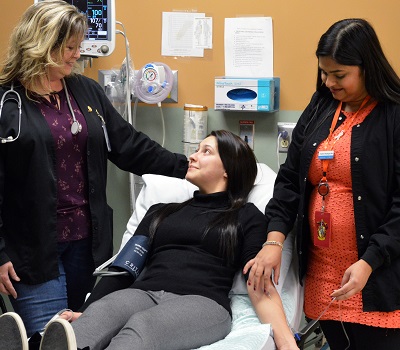
Yvonne Pettipas (left) and Charlene Rodrigues (right), registered nurses, run the QEII’s Supportive Care Clinic, the only nurse-led clinic of its kind in Canada. This clinic allows patients going through radiation therapy access to timely and personalized treatment for side effects, such as dehydration, skin problems and pain. (QEII Foundation)
By Erin Elaine Casey
Terra Thibault, health services manager for Ambulatory Oncology Clinics in the Cancer Centre at the QEII Health Sciences Centre, is one of the driving forces behind the QEII’s Supportive Care Clinic (SCC), where patients going through radiation therapy can receive timely and personalized treatment for side-effects.
Certified oncology nurse Charlene Rodrigues is one of two nurses who run the SCC, the only nurse-led clinic of its kind in Canada.
“When patients have ongoing radiation treatment, they can have side-effects like skin problems, dehydration and pain,” explained Rodrigues.. “The nurses who work here have always known that there was a need for this clinic and that need has now been recognized.”
Before, patients experiencing side-effects could be seen at the cancer centre, but there was no specialized clinic.
“If we can support them, we can decrease hospital admissions and emergency department visits,” said Thibault. “From a nursing perspective, you feel like you can take that extra time to take care of that patient. It’s the right care at the right time.”
The SCC opened in September 2018 as a pilot project running three or four days a week in a borrowed space.
Today, the clinic is permanent and has two dedicated nurses and a dedicated physician on call five days a week. Patients are assigned to one nurse and there’s a phone line where they can leave messages.
From the time it opened to the end of November 2019, the SCC has carried out 1,424 supportive care activities, including rehydration, dressing changes, IV line and feeding tube care and pain management.
As the largest specialized cancer care centre for Atlantic Canadians, the QEII delivers world-class care to address some of Canada’s highest cancer rates.
“The challenge we face is patients having to travel up to hundreds of kilometres for care, which is really different than if you live in Toronto,” explained Dr. Jean-Philippe Pignol, head of the Department of Radiation Oncology and a professor at Dalhousie University.
Patients typically require a few weeks of daily radiation treatment and can experience side-effects for several weeks after finishing. “These side-effects can be very scary for everyone, including the local doctor.”
Dr. Pignol and his team knew they needed radiation oncology custom-made for Nova Scotians.
“We focus on a one-stop shop,” he said..
That includes the SCC and the newly established Rapid Response Clinic.
Another pilot project currently running one day a week, the Rapid Response Clinic provides urgent care for patients who need immediate relief from symptoms like pain.
“Within four hours, they’ve been seen, received their radiation treatment and developed a pain management plan with their nurse,” added Thibault. “And some people are coming from Yarmouth, for example. So, a process that used to take all day and be very hard on the patient is much easier now.”
The clinic has also had a positive impact on patients who previously needed to stay in hospital to manage their symptoms.
“Hospital admissions are reduced by almost 30 per cent,” said Dr. Pignol.
Rodrigues, along with Yvonne Petitpas, the clinic’s other dedicated nurse, recently presented at the annual CANO (Canadian Association of Nurses in Oncology) conference in Winnipeg.
“It was standing room only,” said Rodrigues “We’re patient-focused and patient-centred. As front-line nurses in supportive care, we feel so empowered to make decisions and carry out interventions to help patients right away.”
Everyone agrees making the SCC a reality was a team effort, from the highest levels of leadership, including health services director for the cancer care program Jill Flinn and every member of the cancer centre staff.
Dr. Pignol gives a great deal of credit to Thibault and the nursing team.
“What they’ve developed is quite unique,” said Dr. Pignol. “The Supportive Care Clinic is a smart and inexpensive idea with a huge return.”
At the end of the day, it’s the patients who reap the greatest rewards of this high standard of care. For Rodrigues, that means patients feel seen.
“This is what we do and what we love doing,” she said. “We’re validating their questions and validating their experience: You’re important and your challenges are important.”



